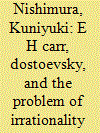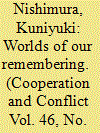| Srl | Item |
| 1 |
ID:
104036


|
|
|
|
|
| Publication |
2011.
|
| Summary/Abstract |
Despite a number of recent studies of Carr's classical theory of international relations, scholars still virtually ignore his early biographical works, especially the one on Dostoevsky. By recovering the connection between Carr's view on international politics and that on Dostoevsky, the present article attempts to advance our understanding about the meaning of Carr's realism-utopianism dichotomy. What Carr tried to do in The Twenty Years' Crisis was to transcend the nihilistic relativism that appeared as a corollary of the rise of the problem of human irrationality. Carr learned from Dostoevsky the epochal meaning of this problem as well as vital insights for generating his own solution to it. Thus arguing, the present article aims at renewing our awareness of the significance of context in the inquiries into early International Relations as well as adding another contribution to the recent revisions of classical realism.
|
|
|
|
|
|
|
|
|
|
|
|
|
|
|
|
| 2 |
ID:
104060


|
|
|
|
|
| Publication |
2011.
|
| Summary/Abstract |
Attempts to deal with the agent-structure problem have often resulted in the introduction of alternative forms of structuralism. Scholars have thus failed to observe the construction and reconstruction of subjectivity, which occurs as an eternal process because of the simple fact that each of us lives in his or her own time. This article attempts to provide an alternative approach to the agent-structure problem by reformulating it as an issue of identity. Especially in comparison with Lévinas, Ricoeur's thought of memory proves helpful in grappling with the problem, not by presupposing the coherent entity of either agent or structure, but by directing our attention to the in-between. It also enables a nuanced analysis of social change, which always needs to be comprehended in its tension with the leanings toward stability. A brief analysis of the literary discourses after the Great War illustrates this point. As a whole, the article aims to recover beings' temporality at the centre of the agent-structure problem and thus reconstruct the problem as innately unstable agents' search for their constantly changing identity.
|
|
|
|
|
|
|
|
|
|
|
|
|
|
|
|